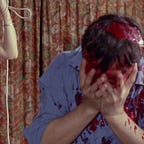Roscoe "Fatty" Arbuckle's Leap Year
Roscoe "Fatty" Arbuckle was one of the biggest screen comics of the 1910s, in more ways than one. His impact cannot be overstated. He made a star out of Buster Keaton when he cast him as his regular co-star in his many slapstick two-reelers. He is also said to have mentored the likes of Charlie Chaplin and Bob Hope during their time at the Keystone studio. He was such a big name that, in 1920, Paramount signed a contract with him worth a million dollars. Out of this contract came nine feature films produced in the early '20s.
Arbuckle was riding high, but that all came crashing down in September of 1921, when he was arrested and charged with the rape and manslaughter of Virginia Rappe. He was accused of forcing himself on top of her while she was intoxicated, and rupturing her bladder. There were three trials held, and after two hung juries, he was ultimately acquitted of the charges by the third jury, who spent most of their deliberations drafting an apology letter to Arbuckle. During the whole ordeal, the Court of Public Opinion had declared him guilty until proven innocent, a judgment that is still alive and well in today's drama-fueled climate.
The Arbuckle trial was the first major Hollywood sex scandal, and during the trials, Paramount moved to sever all ties with him, blocking the release of his films in the United States. It is believed that they destroyed all prints of his films in their possession. However, some prints of his films had already found their way overseas, and would be screened throughout Europe in the following years.
On January 11th, 1924, nearly two years after Arbuckle’s acquittal, Leap Year, one of the features he made in 1921, premiered in France, before making its way to the rest of Europe throughout the year. Whether it was deliberate or not, the Europeans had the good sense to wait until the next Leap Year arrived to release the film, unlike what Paramount likely planned. It’s similar to that other rom-com titled Leap Year which was made in 2010. What were they thinking? I’m not sure what the significance of Leap Year is to Arbuckle’s film. A date is never mentioned.
The film sees Roscoe as a wealthy bachelor, said to fall in love with every girl he meets. But really, he's so innocent and pure that when he gets anxious, he relaxes himself with a drink… of water. This was not the best look after what transpired at the trials. If that wasn't enough to tug your collar, he is constantly followed around by a little black boy carrying his golf clubs.
He is in love with one woman (the names are not important), but through some wacky misunderstandings, he finds himself engaged to three other women, all because he's just too goshdarn polite to say, "No!", or better yet, "Talk to the hand!" With the character being such a ladies' man, it's no surprise that Arbuckle was one of the directors. He went uncredited.
The other director, the one who got the credit, was James Cruze, a prolific filmmaker during the silent era, and he helmed six of Arbuckle's features at Paramount. Cruze's career ended nearly a decade into the talkies as he grappled with alcoholism. He was unemployed in his last years, and in 1942, he ended his own life at the age of 58.
Damn, this is a depressing article…
Leap Year does something I can't remember ever seeing in a silent film. The title cards set each scene by describing the establishing shots, like you're reading the script. Take a look…
Arbuckle's three fiancées end up staying in the same house as him, each of them oblivious to the others' presence, drifting in and out of Roscoe's room without ever crossing paths with each other.
The brother of one of the fiancées arrives and threatens him with a gun in his coat, should his sister be let down. This gag would later be executed to perfection in El esqueleto de la Señora Morales nearly four decades later.
In the climax, Roscoe is chased all over the garden by a mob of people, and when they catch up to him, the three fiancées confess their engagements to other men: his partner, his butler (who was randomly granted a Lordship), and his "girl-hater" uncle. At the end, Roscoe proposes to his true love, and it turns out that those camera set-ups in the title cards actually have a pay-off…
Leap Year is a pretty standard comedy of the day, and if you're a fan of the silent comics, then you may enjoy this one. It is of particular significance, as it was the last holdover from Roscoe's glory days that eventually got a release. Most of his Paramount features are either lost or being held by those damn archives, like they still own a copyright.
Despite his exoneration by the jury, the damage had already been done, and Arbuckle's career wouldn't recover. He maintained friendships with people in the industry, like James Cruze and Buster Keaton, who would grant him minor, uncredited roles in later films. At the arrival of the talkies, he would star in a series of shorts during the Pre-Code era. On June 29th, 1933, he died in his sleep of a heart attack. He was 46 years old.
